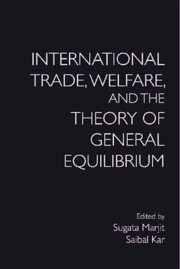Book contents
- Frontmatter
- Contents
- List of Figures and Tables
- Introduction
- 1 Thoughts and Remarks after 50 Years of Simple General Equilibrium Models
- 2 Adjustment Costs and Trade Liberalization
- 3 Farsightedly Stable FTA Structures: The Roles of Preexisting Tariff Rates
- 4 Skilled–Unskilled Wage Inequality and Dynamic Skill Accumulation: A Theoretical Analysis
- 5 FDI in Education vs FDI in Commodity Production: A Theoretical Model
- 6 Skilled Migration and Foreign Aid in a General Equilibrium Model of Monopolistic Competition
- 7 Trade, Factor Flows, and Product Variety in a Small Open Economy
- 8 Product Differentiation, Quality of Innovation, and Capital Mobility: A General Equilibrium Analysis
- 9 Cross-Border Mergers and International Trade: A Vertical GOLE Model
- 10 International Trade and Production Organization: A Review of Contemporary Literature
- 11 Negative Production Externalities, Labor Market Imperfection, and Production Tax Policy in a Developing Economy
- 12 Tax-Financed Public Transfers: A Mechanism for Double Taxation
- Contributors
- Index
4 - Skilled–Unskilled Wage Inequality and Dynamic Skill Accumulation: A Theoretical Analysis
Published online by Cambridge University Press: 01 November 2018
- Frontmatter
- Contents
- List of Figures and Tables
- Introduction
- 1 Thoughts and Remarks after 50 Years of Simple General Equilibrium Models
- 2 Adjustment Costs and Trade Liberalization
- 3 Farsightedly Stable FTA Structures: The Roles of Preexisting Tariff Rates
- 4 Skilled–Unskilled Wage Inequality and Dynamic Skill Accumulation: A Theoretical Analysis
- 5 FDI in Education vs FDI in Commodity Production: A Theoretical Model
- 6 Skilled Migration and Foreign Aid in a General Equilibrium Model of Monopolistic Competition
- 7 Trade, Factor Flows, and Product Variety in a Small Open Economy
- 8 Product Differentiation, Quality of Innovation, and Capital Mobility: A General Equilibrium Analysis
- 9 Cross-Border Mergers and International Trade: A Vertical GOLE Model
- 10 International Trade and Production Organization: A Review of Contemporary Literature
- 11 Negative Production Externalities, Labor Market Imperfection, and Production Tax Policy in a Developing Economy
- 12 Tax-Financed Public Transfers: A Mechanism for Double Taxation
- Contributors
- Index
Summary
Introduction
The increasing wage income inequality throughout the world is a widely discussed topic in Development Economics. The conventional belief is that globalization brings a welfare improvement, both from aggregative and distributive perspectives. However, with regard to its distributive effect, many empirical researchers show that income inequality has surged in different countries because income and employment of unskilled labor have declined in a significant manner comparatively to those of skilled labor. This growing income inequality was experienced in the United States between the 1960s and the 1970s. A similar phenomenon was observed in European countries between 1978 and 1988. A similar picture is also noticed in many developing countries. This is primarily because wage inequality has increased in many Latin American and South Asian countries since the mid-1980s. However, the experience by the East Asian countries between the 1960s and the 1970s upholds the conventional theory that a greater openness to international trade tends to reduce the skilled–unskilled wage gap. Various studies provide various explanations for this increase in income inequality. Trade liberalization and technological progress are the main two controversial reasons for this phenomenon. Many empirical studies point out other causes for this growing inequality, and these include international outsourcing, increase in the price of skill intensive good, entry of overpopulated low-income countries in the global market, etc.
Theoretical literature also deals with the problem of growing wage inequality and trade liberalization; a subset of this literature is based on the framework of static competitive general equilibrium models. These models consider two different types of labor—skilled and unskilled. These models consider the ratio of the skilled wage rate to the unskilled wage rate as a measure of wage inequality. We can divide the existing theoretical literature into two groups. One group of models assumes exogenous supply of skilled labor, and this group includes the works of Gupta and Dutta (2011, 2010a), Chaudhuri (2008, 2004), Yabuuchi and Chaudhuri (2007), Chaudhuri and Yabuuchi (2008, 2007), Beladi et al. (2008), Marjit and Acharyya (2006, 2003), Marjit and Kar (2005), Marjit et al. (2004), etc. Hence, these models cannot analyze the role played by endogenous skill formation on the skilled–unskilled wage inequality.
- Type
- Chapter
- Information
- Publisher: Cambridge University PressPrint publication year: 2018



